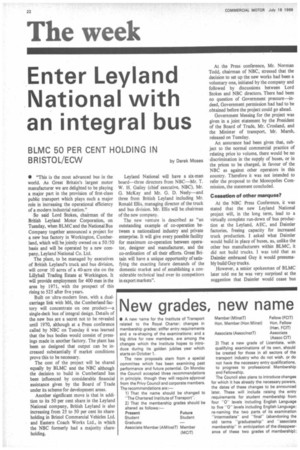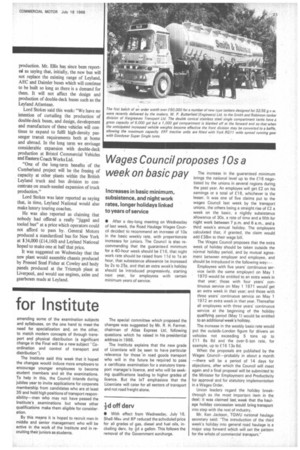Enter Leyland National with an integral bus
Page 24

Page 25

If you've noticed an error in this article please click here to report it so we can fix it.
BLMC 50 PER CENT HOLDING IN
BRISTOL/ECW by Derek Moses
• "This is the most advanced bus in the world. As Great Britain's largest motor manufacturer we are delighted to be playing a major part in the provision of first-class public transport which plays such a major role in increasing the operational efficiency of a modern industrial nation."
So said Lord Stokes, chairman of the British Leyland Motor Corporation, on Tuesday, when BLMC and the National Bus Company together announced a project for a new bus factory in Workington, Cumberland, which will be jointly owned on a 50/50 basis and will be operated by a new company. Leyland National Co. Ltd.
The plant, to be managed by executives of British Leyland's truck and bus division, will cover 10 acres of a 40-acre site on the Lillyhall Trading Estate at Workington. It will provide employment for 400 men in the area by 1971, with the prospect of this rising to 525 after five years.
Built on ultra-modern lines, with a dualcarriage link with M6, the Cumberland factory will concentrate on one product—a single-deck bus of integral design. Details of the new bus are a secret not to be revealed until 1970, although at a Press conference called by NBC on Tuesday it was learned that the bus bodies would consist of pressings made in another factory. The plant has been so designed that output can be increased substantially if market conditions prove this to be necessary.
The cost of the project will be shared equally by BLMC and the NEC although the decision to build in Cumberland has been influenced by considerable financial assistance given by the Board of Trade under its scheme for development areas.
Another significant move is that in addition to its 50 per cent share in the Leyland National company, British Leyland is also increasing from 25 to 50 per cent its shareholding in Bristol Commercial Vehicles Ltd. and Eastern Coach Works Ltd., in which the NBC formerly had a majority shareholding. Leyland National will have a six-man board—three directors from NBC—Mr. T. W. H. Galley (chief executive. NBC), Mr. G. McKay and Mr. G. D. Neely—and three from British Leyland including Mr. Ronald Ellis. managing director of the truck and bus division. Mr. Ellis will be chairman of the new company.
The new venture is described as "an outstanding example of co-operation between a nationalized industry and private enterprise. It will give every possible facility for maximum co-operation between operator, designer and manufacturer, and the co-ordination of all their efforts. Great Britain will have a unique opportunity of satisfying the exacting future demands of the domestic market and of establishing a considerable technical lead over its competitors in export markets". At the Press conference, Mr. Norman Todd, chairman of NBC, stressed that the decision to set up the new works had been a voluntary one, initiated by the company and followed by discussions between Lord Stokes and NBC directors. There had been no question of Government pressure—indeed. Government permission had had to be obtained before the project could go ahead.
Government blessing for the project was given in a joint statement by the President of the Board of Trade, Mr. Crosland, and the Minister of transport. Mr. Marsh, released on Tuesday.
An assurance had been given that, subject to the normal commercial practice of relating price to volume, there would be no discrimination in the supply of buses, or in the prices to be charged, in favour of the NBC as against other operators in this country. Therefore it was not intended to refer the proposal to the Monopolies Commission, the statement concluded.
Cessation of other marques?
At the NBC Press Conference, it was stated that the new Leyland National project will, in the long term. lead to a virtually complete run-down of bus production at the Leyland. AEC, and Daimler factories, freeing capacity for increased truck production. I asked what Daimler would build in place of buses, as, unlike the other bus manufacturers within BLMC, it did not build trucks. I was told that as Daimler embraced Guy it would presumably build Guy trucks.
However, a senior spokesman of BLMC later told me he was very surprised at the suggestion that Daimler would cease bus production. Mr. Ellis has since been reported as saying that, initially, the new bus will not replace the existing range of Leyland, AEC and Daimler buses which will continue to be built so long as there is a demand for them. It will not affect the design and production of double-deck buses such as the Leyland Atlantean.
Lord Stokes said this week: "We have no intention of curtailing the production of double-deck buses, and design, development and manufacture of these vehiels will continue to expand to fulfil high-density passenger transit requirements both at home and abroad. In the long term we envisage considerable expansion with double-deck production at Bristol Commercial Vehicles and Eastern Coach Works Ltd.
"One of the long-term benefits of the Cumberland project will be the freeing of capacity at other plants within the British Leyland truck and bus division to concentrate on much-needed expansion of truck production."
Lord Stokes was later reported as saying that, in time, Leyland National would also make luxury touring coaches.
He was also reported as claiming that nobody had offered a really "jigged and tooled bus" at a price which operators could not afford to pass by. General Motors produced a standardized bus for New York at $34,000 (£14,160) and Leyland National hoped to make one at half that price.
It was suggested on Wednesday that the new plant would assemble chassis produced by Pressed Steel Fisher at Cowley and body panels produced at the Triumph plant at Liverpool, and would use engines, axles and gearboxes made at Leyland.
















































































































